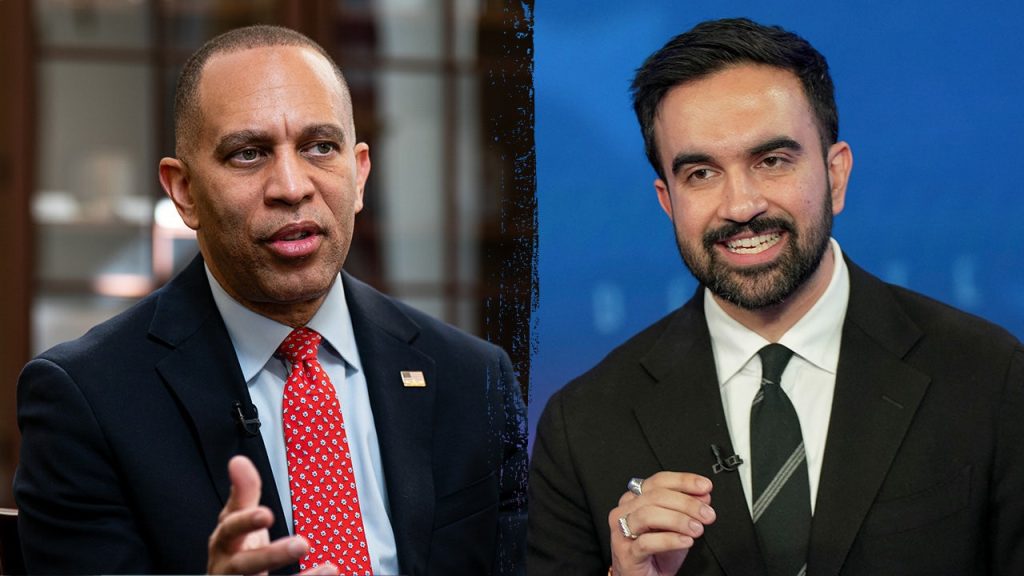Hakeem Jeffries’ Political Balancing Act: The Long Road to Endorsing Zohran Mamdani
In the high-stakes world of New York City politics, House Minority Leader Hakeem Jeffries found himself walking a delicate tightrope regarding the endorsement of Democratic mayoral candidate Zohran Mamdani. For months, Jeffries dodged direct questions about whether he would support Mamdani, creating speculation and tension within Democratic circles. As late as the morning before early voting began, when asked if he was ready to endorse Mamdani, Jeffries simply replied, “Stay tuned,” promising to articulate his position “momentarily, at some point in advance of early voting.” True to his word, though cutting it remarkably close, Jeffries released a statement Friday afternoon backing Mamdani, saying the candidate “has relentlessly focused on addressing the affordability crisis and explicitly committed to being a Mayor for all New Yorkers.” The statement concluded with what might seem obvious but had become surprisingly contentious: “I endorse the Democratic ticket.”
The prolonged hesitation highlighted deeper divisions within the Democratic Party that Republicans were eager to exploit. House Speaker Mike Johnson seized the opportunity, declaring, “What we’re witnessing is truly the end of the Democratic Party as we’ve known it,” suggesting Jeffries had “finally relented” and “given in” by endorsing a socialist candidate. Republicans framed the situation as evidence that “there is no longer a place for centrists and moderates” in the Democratic Party. They even connected Jeffries’ endorsement decision to broader political maneuvers, claiming Democratic leaders feared primary challenges from the left, with Johnson speculating that Jeffries and Senate Minority Leader Chuck Schumer “decided to save their own skin” by endorsing “the Marxist Mamdani” and shutting down the government in “an unprecedented move.”
When pressed about the delay, Jeffries explained on MSNBC that Mamdani wasn’t “someone that I knew prior to him receiving the Democratic nomination” and that he wanted “to sit down and have some conversations” first. This rationale had been consistent since Mamdani’s primary victory on June 25, when Jeffries offered congratulations but stopped short of an endorsement, saying only that they planned to meet “shortly.” Throughout the summer and into fall, reporters repeatedly questioned the holdup, with CNN’s Dana Bash noting it was “pretty unusual for a high-ranking Democrat like yourself to withhold the endorsement of your party’s nominee.” Jeffries pushed back on the framing, insisting, “I don’t think we have withheld an endorsement. We are engaging in a conversation about the future of New York City.”
Behind the carefully crafted responses lay genuine concerns about Mamdani’s positions, particularly regarding Israel. When asked directly if his hesitation stemmed from Mamdani not denouncing the term “globalize the intifada,” Jeffries acknowledged, “I have raised several of the issues with him privately, as well as publicly spoken about some of the concerns that I have had.” This admission revealed the difficult position Jeffries found himself in – caught between progressive Democrats energized by Mamdani’s candidacy and moderate voters, including pro-Israel constituents, who viewed the candidate’s positions with alarm. The tension reflected broader challenges facing the Democratic Party as it attempts to maintain unity while addressing ideological differences between its progressive and centrist wings.
Throughout the prolonged endorsement saga, Jeffries faced increasing pressure from multiple directions. Young progressive constituents demanded he support their chosen candidate, while moderates urged caution. As early voting approached, Jeffries continued deflecting, at one point saying, “We’re in the middle of a government shutdown,” before promising to “have more to say about the mayor’s race in advance of early voting.” The situation placed him in a nearly impossible position – not endorsing would anger the left and highlight party divisions, while endorsing risked alienating moderate voters and giving Republicans ammunition for attacks. The endorsement ultimately came down to a political calculation of which outcome presented the lesser danger.
In the end, Jeffries made his decision, throwing his support behind Mamdani while Republicans predictably pounced and moderate Democrats expressed disappointment. The episode illustrates the complex political calculus required of party leaders in today’s polarized environment. While Jeffries’ endorsement is unlikely to determine the outcome of the mayoral race, his handling of the situation revealed much about the challenges facing the Democratic Party. The reluctant, last-minute nature of the endorsement spoke volumes about internal party tensions that aren’t easily resolved. As one political observer might note, Jeffries ultimately chose party unity over ideological comfort, recognizing that a refusal to endorse would have highlighted fractures within the Democratic coalition more damaging than whatever criticism his endorsement might generate. In politics, as in life, sometimes you must choose the least problematic of imperfect options.


